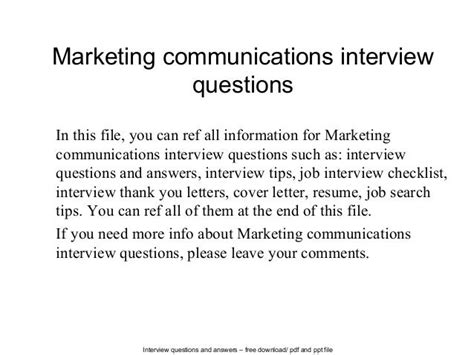Communication Interview: Questions & Answers

Communication is a vital aspect of our lives, and it plays a crucial role in every profession. Effective communication skills are essential for professional success, and they can make or break your career. In this article, we will discuss some common communication interview questions and how to answer them to impress your interviewer.
1. Can you tell us about your communication style?
The interviewer wants to know your communication style, which reflects your personality and work style. Be honest and provide examples of how you communicate with your colleagues, managers, and clients. You can say that your communication style is clear, concise, and respectful, and you adapt it to different situations and people.
2. Describe a time when you had to handle a difficult communication situation.
Employers want to know how you handle difficult communication situations because they are inevitable in any job. Provide a specific example of a challenging communication situation you faced, and explain how you resolved it. Emphasize your problem-solving skills, active listening, empathy, and diplomacy.
3. How do you handle conflicts with colleagues?
Conflict resolution is another critical skill that employers look for. Explain how you approach conflicts, listen actively to the other person’s perspective, and try to find a win-win solution. Provide an example of a conflict you resolved successfully and what you learned from it.
4. How do you communicate with clients or customers?
In many jobs, you need to communicate with clients or customers regularly. Provide examples of how you communicate effectively with clients, listen to their needs and concerns, and provide solutions. Emphasize your customer service skills, patience, and professionalism.
5. Can you tell us about a time when you had to deliver bad news to someone?
Delivering bad news is never easy, but it’s a necessary part of many jobs. Provide an example of a time when you had to deliver bad news to someone, and explain how you approached the situation. Emphasize your empathy, professionalism, and problem-solving skills.
6. How do you handle misunderstandings or miscommunications?
Misunderstandings and miscommunications can happen in any job, so it’s essential to know how to handle them. Explain how you clarify misunderstandings by asking questions, paraphrasing, and confirming understanding. Provide an example of a miscommunication you resolved and what you learned from it.
7. How do you communicate with people from different cultures or backgrounds?
In today’s globalized world, it’s crucial to have cross-cultural communication skills. Explain how you adapt your communication style to people from different cultures or backgrounds, show respect for their customs and beliefs, and avoid stereotypes. Provide examples of how you communicated successfully with people from diverse backgrounds.
8. How do you use nonverbal communication in your work?
Nonverbal communication, such as body language and facial expressions, can convey as much meaning as words. Explain how you use nonverbal communication to enhance your message, show empathy, and build rapport with others. Provide examples of how you used nonverbal communication successfully in your work.
9. How do you handle communication in a crisis situation?
Crisis situations can be challenging to handle, but effective communication is crucial. Explain how you stay calm and composed in a crisis, communicate clearly and concisely, and provide information to those who need it. Provide an example of a crisis situation you handled successfully and what you learned from it.
10. How do you handle communication overload?
In some jobs, you may receive an overwhelming amount of communication, such as emails, phone calls, and messages. Explain how you prioritize your communication, set boundaries, and use time-management skills to handle communication overload effectively. Provide examples of how you manage your communication effectively.
Conclusion
Effective communication skills are essential for professional success, and they can make a significant difference in your career. In this article, we discussed ten common communication interview questions and how to answer them successfully. By preparing for these questions and practicing your communication skills, you can impress your interviewer and land your dream job.
FAQs
What are the most important communication skills?
The most important communication skills include active listening, empathy, clarity, conciseness, diplomacy, adaptability, and respect.
How can I improve my communication skills?
You can improve your communication skills by practicing active listening, using clear and concise language, being respectful, adapting to different situations and people, and seeking feedback.
Why are communication skills essential for professional success?
Communication skills are essential for professional success because they enable you to convey your ideas effectively, build relationships with colleagues and clients, resolve conflicts, and achieve your goals.
What are some common communication mistakes to avoid?
Some common communication mistakes to avoid include interrupting others, using jargon or complex language, failing to listen actively, being disrespectful, and making assumptions.
How can I communicate effectively across cultures?
You can communicate effectively across cultures by adapting your communication style to the other person’s culture, showing respect for their customs and beliefs, avoiding stereotypes, and seeking feedback.
